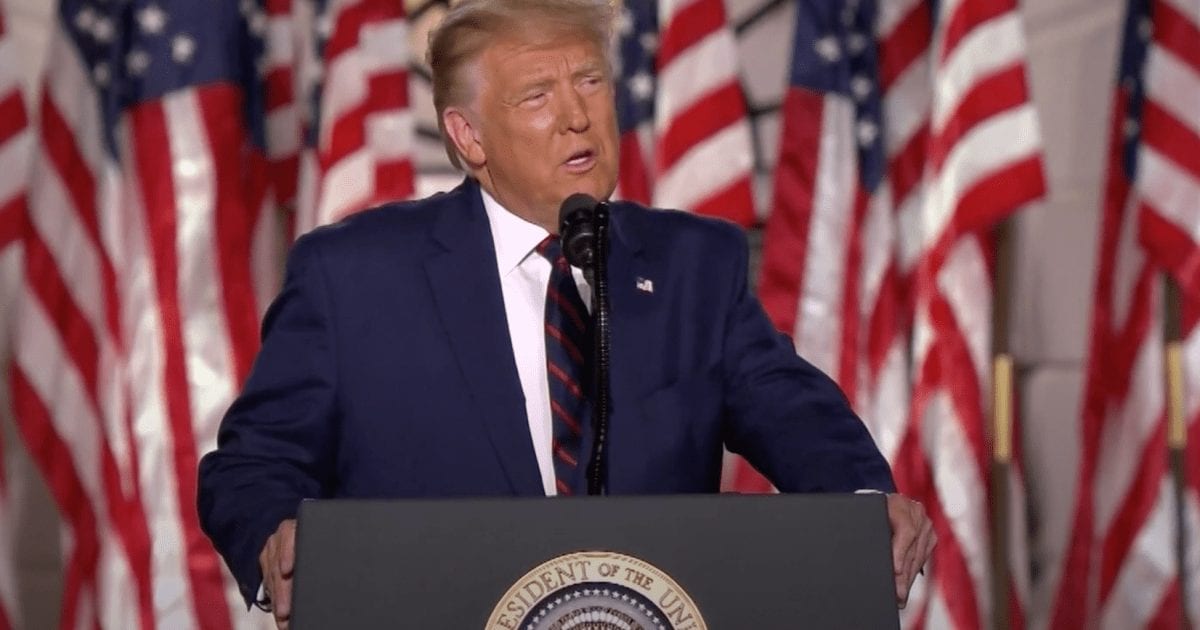At the virtual G20 Leaders’ Summit, President Trump wasted no time blasting the unfair Paris Climate Accord.
Trump called out the true intent of the 2015 global agreement to curb the effects of climate change as nothing more than an attempt to “kill the American economy.”
Check out Trump’s speech at the summit:
In 2017, Trump pledged to withdraw the United States from the one-sided agreement and the departure became official in 2020.
Once again, the globalists are scathing at Trump’s refusal to surrender American resources and economic innovation.
Had Trump withered to the globalist agenda, millions of American jobs and trillions of dollars would have been lost to these wicked people.
If globalist crony Joe Biden does ascend to the presidency in January, rejoining the international pact is one of his first objectives in office.
Today, the Trump Administration officially left the Paris Climate Agreement. And in exactly 77 days, a Biden Administration will rejoin it. https://t.co/L8UJimS6v2
— Joe Biden (@JoeBiden) November 5, 2020
And he plans on bringing swampy John Kerry with him:
https://twitter.com/KaivanShroff/status/1330922372841529346
America will soon have a government that treats the climate crisis as the urgent national security threat it is. I'm proud to partner with the President-elect, our allies, and the young leaders of the climate movement to take on this crisis as the President's Climate Envoy.
— John Kerry (@JohnKerry) November 23, 2020
Although the agreement looked pretty on the surface, it would have done nothing to combat the environmental struggles the world faces today.
Once again, Trump was right as the world’s worst polluters have struggled to cap carbon emissions.
As discussed in The Hill back in 2018:
Nothing horrifies the intelligentsia more than President Trump’s withdrawal from the Paris Agreement on climate change. But, based on new information on China’s emissions, it increasingly looks like the president made the right call.
Just last week, an analysis from Greenpeace indicated that China’s 2018 carbon emissions were on track to grow at the fastest rate in six years. The study, based on government data regarding the use of coal and other energy sources, shows carbon output rising 4 percent in the first quarter of this year. Analysts are projecting similar gains over the next several quarters.
The weakness of the Paris Agreement was that it was lopsided, requiring little from China and a great deal from the U.S. President Obama committed the United States to reducing carbon emissions in 2025 by 26 to 28 percent, which would have meant a substantial jump in electricity costs.
By contrast, China committed to boosting non-fossil fuels to around 20 percent of its overall energy mix by 2030 (a project already underway) and a “hope” that emissions might peak at that time. As one analyst commented in the New York Times, “What China is pledging to do here is not a lot different from what China’s policies are on track to deliver.”
As vague as its goals were, it is becoming clear that the country is unlikely to meet them. To do so would require sacrificing growth to rein in pollution. Since the Chinese Communist Party has pledged to double China’s 2010 GDP by 2020 and to create a “moderately prosperous society” by 2021, that is extremely unlikely.
Fans of the Paris accord have proudly noted that China’s emissions flattened between 2014 and 2016. But that reported hiatus in Beijing’s long-term carbon growth occurred during a period of economic deceleration. In 2017, with a renewed push for industrial investment and output, emissions again began to grow.
China is key. It is by far the world’s biggest source of carbon emissions, producing more than one quarter of the global total and 81 percent more than the United States. The U.S. is the second-largest; India a distant third.
Unlike China, emissions from the United States have trended lower in recent years. The peak occurred in 2005; overall net emissions in 2016 were 12.1-percent lower than in 2005, and the International Energy Agency reports another drop in 2017.
The main driver of lower emissions in the U.S. has been increased substitution of natural gas for coal in producing electric power. Cleaner natural gas became increasingly competitive with cheap coal thanks to widespread use of newly improved hydraulic fracking techniques.
Trump proved that U.S. innovation could simultaneously lower emissions and bolster the economy.
America gained energy independence during the Trump presidency and Biden’s policies would squander that success to appease the globalist lust for power and control.



Join the conversation!
Please share your thoughts about this article below. We value your opinions, and would love to see you add to the discussion!